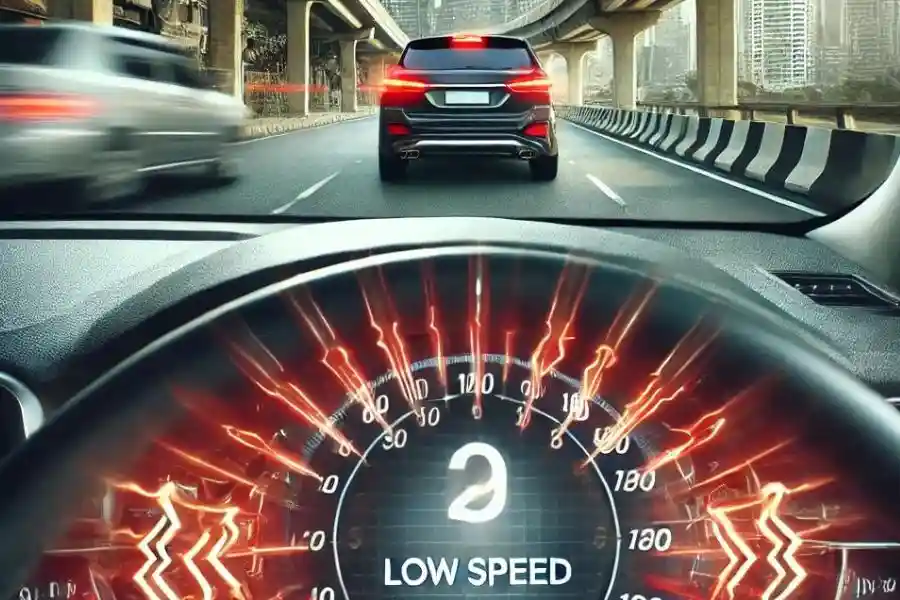While driving, the difference is the most annoying if a car jolts when accelerating at low speeds. This can cause the vehicle to jerk around suddenly due to no power, which is extremely unrefined and worse still could be indicative of an underlying mechanical issue. The problem can have various roots, some of which include engine misfires fuel delivery issues transmission trouble, and a faulty sensor.
This is important to ensure that a battery does not suffer from the loss of efficiency and malfunctions, in turn reducing vehicle performance and creating risks on the road. In this article, we will look at some of the ways that cause a car to jerk when accelerating slowly.
Key Takeaways:
- Car jerking during acceleration at low speeds can indicate problems like fuel delivery issues, transmission troubles, or faulty sensors.
- Proper maintenance, such as regular oil changes and cleaning the fuel injectors, can prevent many jerking-related problems.
- Ignoring this problem can lead to increased wear and tear and more costly repairs down the line.
Understanding Symptoms: Why Does Your Car Jerk at Low Speeds?
How a car jerks during acceleration is varied, and they may have the root remote in one of the components of the automobile. Easier to notice is that the car either will feel like it briefly lurches forward or may “buck” when pressing the gas pedal at low speeds. Though this jerkiness can also be mild, it should never simply be brushed off as nothing while accelerating from every stop or low speed.
What Is Jerking?
- Fuel Delivery Problems: This can be problems with fuel filters, fuel injectors, or the actual fuel pump.
- Transmission malfunctions: If the automatic information is faulty or there are issues with the clutch of a vehicle operated with the manual transmission, this may contain smooth acceleration.
- Ignition system failure: A misfire can happen because the fuel is not kindled perfectly, due to wrong spark plugs or coils.
Identifying these symptoms eventually can help you in avoiding further complexities which we will discuss in the following slide.
Fuel Delivery Problems: The Leading Cause of Jerking During Acceleration
The most typical reason a car jerks when accelerating at low speed is connected to the fuel design. Sometimes, if the engine does not get adequate fuel when it needs its best behavior, then you can also commit to some stammering acceleration.
- Clogged injectors: Fuel injectors have holes in the tip where fuel flows from. This limits the fuel supply to the engine, which leads to jerking or hesitating.
- Fuel pump failure: The fuel pump may not provide enough fuel stress to the engine, particularly during acceleration.
- Clogged fuel filters: A clogged fuel filter restricts the flow of gasoline, and may result in the car jerking during acceleration at low speeds.
Answer
- To reduce jerking this could definitely be done with the help of regular maintenance including cleaning or changing fuel injectors and filters.
Did you know? The research recommends to not neglect your fuel injectors as doing otherwise may decrease your MPG in the long run and also you get 10% better engine performance, meaning smoother acceleration from a standstill.
Transmission Issues
Another common cause of jerking during acceleration is transmission problems. The transmission then functions to shift gears as needed, particularly at higher speeds in the case of automatic vehicles. A man whose car jerks third-party submissions are usually stringed together by mods. If your car stumbles upon acceleration, this may indicate a problematic trans corner.
Common Transmission-Related Culprits:
- Low transmission fluids: When the available fluid amount becomes critically low, it may show up as jerks from erratic gear shifts.
- Clutch plates: For manual cars, if the clutch is worn out, then this can also cause some jerking movement as the driver tries to shift gear.
- Possible TCM (transmission control module) failure: Most modern cars use electronics to handle shifting so if the module fails, gears may feel bangy or shift delayed.
Solution
Check and replace transmission fluid as often as said to do so by your car’s manufacturer. If you think there might be a problem with your transmission, get your truck in for diagnostic testing.
TIP: Your transmission fluid should always be topped up – you can check it monthly and not wait until you feel jerking when shifting gears.
Ignition System Troubles
Your ignition system plays a large part in making sure that the fuel in your engine will burn properly. Faults in this system cause the engine to misfire, which can trigger jerking.
Typical Ignition System Problems
Defective spark plugs — Spark plugs are liable for sparking the fuel-air mix in your machine. In case the plugs are modeled out or are faulty, the discharge process will be undone so jerks occur.
There is a problem with the ignition coils: The ignition coil has an electric current that streams to the spark plugs. When a cycle runs bad, the energy for the spark plug to blaze does not share as it should and so you get some misfires, starting.
Solution
Return your spark plugs every 30,000 miles or according to advice in the owner’s manual. Wild running is often due to ignition coil loss; if you still have to jerk after everything else, it might be time for replacement ignition coils. It is essential to note that a spark plug in poor situation can lower gas mileage by as much as 30%. Replace them regularly for a better, softer ride.
Sensor Failures: The Role of the Mass Air Flow (MAF) and Throttle Position Sensors
Sensors play a critical role in modern-day cars, accountable for keeping an eye on and controlling engine versions. Before a review engine light arrives on, failing detectors may send false information, leading to erratic conduct like jerking during acceleration.
How It Works and Why It Causes Jerking: Key sensors responsible include:
- Mass Air Flow (MAF) sensor: Mounted before the throttle body to measure incoming air. If it fails, the engine may receive the wrong air-fuel mixture, resulting in jerky movement.
- Throttle Position Sensor (TPS): Reports the throttle position to the engine. A failure may cause the engine to misread throttle input, leading to jerky behavior.
Solution: Clean the MAF sensor or replace it if needed. If the throttle position sensor seems faulty, have it diagnosed by a professional.
Pro Tip: Regular sensor cleaning prevents jerking and ensures your engine runs efficiently.
Air Intake Issues: Ensuring Proper Airflow to the Engine
A blocked or dirty air intake can cause a car to jerk at low speeds. The engine needs a precise mix of air and fuel to function smoothly, and any disruption in airflow affects performance.
Typical Air Intake Issues:
- Restricted airflow by the air filter: A dirty air filter limits airflow to the machine, causing the vehicle to run rich (too much fuel, not enough air), often generating jerky acceleration.
- Air intake hose issues: Leaks or cracks in the air input hoses can allow unmetered air into the motor, leading to hesitation or jerking.
Solution: Change air filters every 12,000 to 15,000 miles for optimal airflow. Inspect air intake hoses and replace any damaged ones.
Fact: A clogged air filter can reduce acceleration by 11%, leading to jerking at low speeds.
Other Mechanical and Electrical Factors to Consider
Other mechanical and electrical causes can make acceleration jerky, in addition to the common reasons previously discussed.
Possible Mechanical Causes:
- Worn engine mounts: If these engine supports have shifted, the engine can move under load, causing jerking when accelerating.
- Defective driveline parts: Issues with the driveshaft or axles can lead to shaking and jerking.
Electrical System Failures:
- Broken wiring: Loose or damaged wiring can cause intermittent power delivery, leading to jerking.
- Computer (ECU) issues: The ECU controls many aspects of engine performance. A faulty ECU can cause various engine problems, including jerky acceleration.
Fix: Regularly checking engine mounts, driveshafts, and wiring can help prevent jerking. Have the ECU inspected by a mechanic for any errors or damage.
Conclusion
You should address vehicle jerks when accelerating at low speeds immediately. Jerking can signal minor issues like clogged fuel injectors or dirty spark plugs, or larger problems such as transmission failures or sensor malfunctions. Identifying and resolving these problems early can help ensure a smoother, safer drive.
Have you ever experienced jerking in your vehicle? What steps have you taken to fix it? If this guide was helpful, check out our other articles on car maintenance and troubleshooting common vehicle problems.

